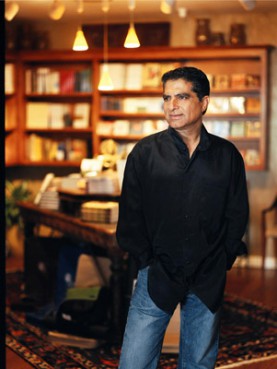
(RNS2-NOV17) Spiritual guru Deepak Chopra is the author of “Muhammad: A Story of the Last Prophet.” For use with RNS-10-MINUTES, transmitted Nov. 17, 2010. RNS photo courtesy HarperOne.
(RNS) Spiritual and alternative-medicine guru Deepak Chopra, 64, has written dozens of books about faith. His latest, “Muhammad: A Story of the Last Prophet,” is a fictionalized biography narrated by the people around him, including a Christian hermit, a Jewish scribe, two of his daughters, a convert, and an enemy.
Chopra spoke about his experience writing on Islam’s founder and prophet. Some answers have been edited for length and clarity.
Q: What makes a Hindu American from India decide to write a biography on Muhammad?
A: I grew up with a lot of Muslim friends, and the whole idea of revelation has been a lifelong interest of mine. I’ve written about Jesus and Buddha, and my publisher suggested that I do Muhammad next. But I was reluctant in the beginning because Islam is much more recent and we have access to a lot of thehistory, and some of the facts are not very palatable. There’s the beheading of the Jews, there’s the marriage to Aisha, a girl of 6 — we are told all this from history, confirmed by scholars.
Biographies written by Muslims are straightforward — they don’t brush aside the facts; in fact, they justify them. Some Western biographies are apologist, and do not portray the negative side at all. So, it was a choice that I had to make: do I do it with integrity, honesty, respect, but without being an apologist? Finally I decided, why not?
Q: Weren’t you worried about becoming a target of radical Muslims?
A: Once I decided to write the book, I didn’t want to think about that because it would have interfered with my writing. I spoke to author Irshad Manji, who has five fatwas on her, who said it’s not as much a thing as it used to be. She said she doesn’t even think about it.
Now that my book is out, there have been a few (negative) things on Twitter from Indonesia and Saudi Arabia, like “who is he to write about Islam and the Prophet, he’s committed blasphemy,” but I don’t see it gaining traction.
Q: There are some things that you didn’t include — for example, you don’t have a chapter from Aisha’s perspective. Why not?
A: I have two of his daughters and his first wife. But Aisha was 6 when she was married and 9 when the marriage was consummated, and I have no idea how to get into the mind of a 6- or 9-year-old. I did include her in the last chapter, where she plays an important role (after Muhammad’s death, as an adult), in the way she wins over his enemy.
Q: Your book portrays Muhammad as holy from childhood, even from conception. But isn’t he generally understood as an ordinary man until later in life?
A: There was something definitely special about him from the beginning. He was introverted, he did not hang out with the other people his age, he took time to go into solitude. And the fact that he was illiterate makes it even more special.
If you’ve heard the Quran, it has a very special grammatical quality where the sound echoes the sentence. Even if you did not speak Arabic, it’s hypnotic. It’s similar to hearing the Vedas chanted, or the Torah. How does somebody who is illiterate, who has no ambition to be anything special, start reciting this beautiful verse? This is the mystery of revelation.
Q: Why isn’t Muhammad subtitled “A Story of Enlightenment,” like your biographies of Buddha and Jesus?
A: In the case of Buddha, he spoke of enlightenment and he taught of enlightenment. And Jesus’ Sermon on the Mount is clearly spoken from a state of enlightenment. But Muhammad is more complex, and he did not claim to be enlightened. Muhammad said, “I am a man among men.”
Q: How else was writing about Muhammad different than Buddha and Jesus?
A: I like Muhammad a lot, because he’s like us more than anybody else. Jesus is just so exalted, and Buddha is just so exalted, it’s almost beyond our reach. Muhammad is more human, more self-doubting, even self-tortured at times. His story is full of adventure, intrigue, betrayal. It’s a great story.
Q: I’ve heard that your next book will be about God — but, from whose perspective?
A: I’m doing a book called “The Future of God,” about science and spirituality and the understanding of consciousness, and one called “When God Spoke,” looking at the experience of divinity through various Eastern and Western saints, including a lot of women. It’s not God as some kind of image or idea or concept, but what the experience means.




